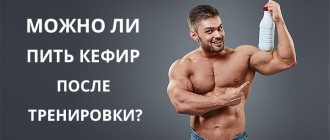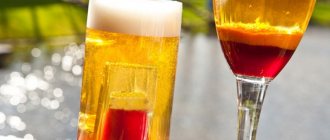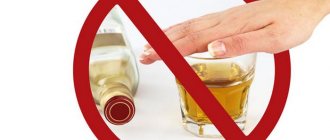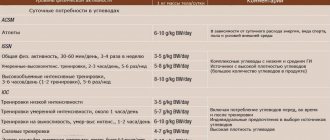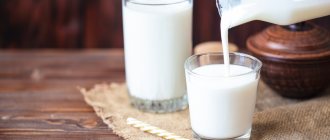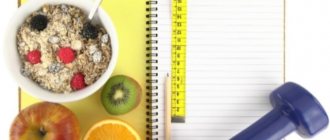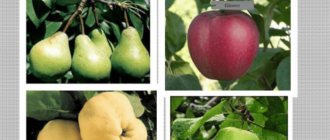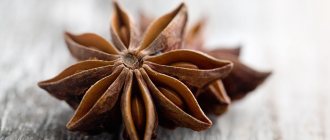There are so many fitness lifehacks you can find on the Internet. Some of them really work, others look very dubious. One of the fairly common tips is to drink non-alcoholic beer immediately after training. Allegedly, the drink helps the body recover faster after heavy exercise. Is this really so, says certified nutritionist and personal trainer Andrey Semeshov
.
Raise the temperature. Is it possible to combine sports and alcohol?
We figured out whether alcohol prevents you from losing weight, how beer is beneficial and whether athletes drink it.
Rules of use
Is it possible, in principle, to combine physical activity with drinking alcoholic beverages? By and large, yes, but it’s worth doing this taking into account some recommendations:
- You should not exercise for two days after drinking alcohol - during this time the risk of muscle injury increases;
- You should not drink beer or consume other alcohol for 2 days after active strength training - this will simply reduce all the efforts made to “no”;
- It is better to use protein products (for example, meat or fish) as a snack - they will reduce the negative impact of alcohol-containing drinks on the body;
- To “ease the fate” of your body, the next morning it is recommended to drink a lot of mineral water and take at least a few aspirin tablets.
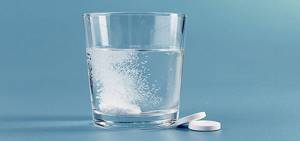
Every athlete should be aware that active physical activity and alcohol are not “friends” with each other. In addition to the fact that alcohol “supplies” unnecessary calories to the body (“interferes” with intensive weight loss), it also takes away the body’s ability to recover and gain muscle mass (slows down metabolism, blocks the synthesis of “necessary” hormones).
If an athlete allows the consumption of beer or other alcoholic beverages, he must adhere to the indicated rules - this is the only way he will cause the least harm to his body.
Previous Proper nutritionAn apple after a workout: is it possible and necessary? Next Proper nutritionMelon after training and its benefits

Beer belly
Is it okay to drink beer after a workout if you're trying to lose weight? Men are strictly prohibited from doing this, as this may result in a large beer belly. But if a man actively pumps up his abs and also drinks beer, then this problem will get even worse.
Volumes will grow and grow (and not only muscle volumes).
If you are trying to lose weight, then drinking alcohol is not the best solution. Better treat yourself with tea, coffee or juice. Such drinks are much healthier and are allowed on a diet.
We suggest you familiarize yourself with How to kill fumes in the morning
What effect does non-alcoholic beer have?
Some believe that since such a drink does not contain ethyl alcohol, its use can be compared to drinking lemonade or kvass. But keep in mind that all substances harmful to the body are retained in the drink, including alcohol. Although its quantity is much less – up to 0.5%. And the impact on many human systems will remain just as negative.
advertising is not displayed
An important point is the calorie content of non-alcoholic beer. It sometimes even exceeds that of a regular foam, says hudeem-bez-problem.ru
Therefore, it doesn’t matter how long after training you drink it, or even the day before classes, the huge calorie content will not go away
Can I drink non-alcoholic beer?
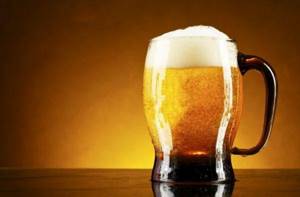
The so-called zero, in fact, is just a marketing ploy. Modern technologies for dealcoholization of the drink do not allow the alcohol to be completely removed - only 0.5 to 1.5 revolutions are retained in the beer. This means that the negative effects of alcohol are still possible.
In addition, we must not forget about harmful chemical additives, as well as the high content of phytoestrogens. This plant substance is an analogue of female sex hormones. Its excess leads to a drop in testosterone, strength indicators, as well as the deposition of fat “like girls” - on the stomach and hips. No athlete will like this additional effect.
How alcohol and protein affect an athlete's body
It is a little secret that alcohol has a negative effect on the human body. And this manifests itself in different aspects.
For example, alcoholic drinks significantly reduce the release of testosterone, an extremely important hormone for every man. And without a sufficient amount of testosterone, although not rapid, but still gradual destruction of muscle tissue occurs
Is it possible to drink protein after alcohol? In fact, it doesn’t make much difference what to drink first and what to drink later. In any case, the result will be unsatisfactory. The thing is that alcohol has a strong effect of draining fluid from the body. Accordingly, the protein used as a supplement comes out along with the liquid, which has not yet had time to be fully absorbed by the body.
We must not forget about the moral harm of alcoholic beverages. Often it has an even greater impact on a person than the physical consequences. One of the main problems is simple laziness and loss of motivation. Even after drinking a glass of beer or a small glass of wine, it will be incredibly difficult to force yourself to go to work out and perform complex exercises with heavy weights. In addition, practicing while intoxicated directly violates safety regulations. You can simply harm yourself, overdo it, get injured, and sometimes even break the simulator and because of this get into a conflict situation with other athletes and employees of the institution.
If we take the main idea from all that has been said, we find that taking protein and alcohol has the following consequences:
- The growth of muscle tissue may remain unchanged;
- The general condition of the body deteriorates noticeably;
- Cortisol levels increase, which blocks normal protein synthesis;
- The athlete’s concentration and performance during training decreases;
- Testosterone levels decrease.
Alcohol and strength sports
Home ▸ Articles ▸ Nutrition ▸ Alcohol and bodybuilding
Alcohol (ethanol or ethyl alcohol) is one of the most ancient and widely used narcotic substances, has many effects on the human body, some of them are positive, but most are negative. Historically, alcohol has been blamed for many tragedies and incidents, from the fall of the Roman Empire to the breakup of countless families. As ironic as it may be, alcohol is made from completely harmless ingredients.
Cereals, fruit juices and honey have been used to make alcoholic beverages for centuries. Alcohol is consumed by a large number of people in different countries of the world, as it can cause relaxation, elevate mood, and evoke a feeling of pleasure. In some respects, alcohol also has medicinal properties, for example, improving the rheological properties of blood, antioxidant action, increasing social adaptability (not referring to alcoholism), anti-stress effect and some others.
It should be taken into account that the ratio of positive and negative effects largely depends on the dose and frequency of alcohol consumption. Thus, the above positive effects are possible only with small doses (1-2 glasses of wine); larger doses have a significant preponderance in the direction of negative effects. This is partly because alcohol is considered a central nervous system depressant, which has a sedative effect and significantly weakens moral and behavioral boundaries.
Rational thinking, emotional status, logical judgment, speech and coordination of movements, all of which are negatively affected by alcohol. In extreme situations, coma and even death are possible.
Alcohol is especially undesirable in bodybuilding, or any other sport, because it can interfere with recovery, reduce protein synthesis, cause dehydration, suppress motivation, and lead to dietary errors. Even the financial costs of alcohol can be taken into account as damage.
In this article we will look at the main provisions and studies that confirm that alcohol is a poison for the human body, and leads to undesirable consequences for everyone who consumes it to one degree or another. The author does not set out to dissuade you from drinking alcohol; the article merely provides scientific facts and arguments that point to the significant disadvantages of drinking alcohol for athletes.
Biological properties of alcohol
Ethyl alcohol consists of very small molecules that can dissolve in both fats and water. Ethanol is broken down primarily in the liver, where an enzyme called alcohol dehydrogenase breaks down alcohol into acetaldehyde and water, which in turn breaks down into acetate. Acetate is metabolized to water and carbon dioxide, which are excreted from the body in the usual way.
When consumed orally, alcohol is rapidly absorbed from the stomach (20%) and small intestine (80%), much faster than other nutrients.
The chemical properties of alcohol allow it to quickly penetrate the blood and pass through the blood-brain barrier, as a result of which physiological effects occur very quickly, in particular this applies to disruption of brain function.
First of all, ethanol disrupts the function of the cerebral cortex, but the function of the limbic system remains unaffected. But the fact is that the limbic system is the most primitive part of the brain that is involved in thinking and behavior. The limbic system operates at the level of emotions, so a drunk person acts according to his emotions, rather than rationally considered judgments.
As mentioned, alcohol acts as a depressant. It suppresses the transmission of nerve impulses by activating the GABA system. In other words, more inhibitory neurotransmitters are produced in the brain.
Systematic alcohol consumption leads to the formation of tolerance of the GABAergic system, and when alcohol is withdrawn, a so-called rebound effect occurs: the brain is overly activated, and this manifests itself in the classic hangover syndrome: agitation, irritability, tremors, disorientation, hallucinations, and so on.
Alcohol negatively affects the myelin fiber, which envelops all peripheral nerves, thus leading to disruption of the activity of peripheral organs and tissues, including muscles.
Implications for athletes
Alcohol consumption is especially bad for athletes, and there are many reasons for this; it disrupts many metabolic processes that are important for the success of training. Performance, recovery and mental focus, muscle growth - alcohol reduces the performance of all these processes.
Although alcohol is absorbed quickly, it is metabolized quite slowly, and its effects may be present even 2 days after consumption.
In the event that an athlete performs exercises within 48 or even more hours after drinking alcohol, in the amount of only three standard servings of drink, the following is observed:
- Decrease in strength indicators
- Increased reaction time
- Coordination deteriorates
- Fatigue occurs faster
In addition, a number of additional negative manifestations arise:
- Liver function, which plays an important role in anabolism, deteriorates
- Glycogen reserves decrease, and therefore the intensity of training decreases, as there is a deficiency of the main energy substrate
- Thermal regulation of the body is disrupted
- Dehydration, which interferes with muscle growth and protein synthesis in general
- Electrolyte imbalance, which leads to a decrease in the efficiency of almost all metabolic processes.
- Depletion of the depot of some vitamins and deterioration of absorption.
- Negative effects on the cardiovascular system
- Fat formation
And these are just the most important points, the list of which can be increased several times.
Conclusion
Even though the effects of alcohol last for an average of 48 hours after consumption, there are a number of indirect effects that last much longer. A decrease in the quality of training and deterioration in performance are perhaps the most important points for an athlete.
Many people believe that a glass of beer or a glass of wine after a workout is positive and helps you relax faster after a workout and calms you down, but a look at the true processes convinces us that this is a completely wrong point of view. Every athlete, if he respects his work in the gym, should completely abstain from drinking alcohol, especially in the period before competitions.
Is it possible to consume a bottle of soft drink
Non-alcoholic beer differs from alcoholic beer in having a lower ethyl alcohol content (up to 0.5%). All other harmful substances are present in it, as in regular ones.
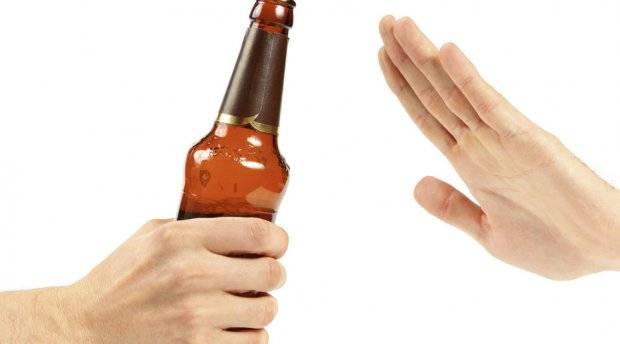
After sports activities, the body needs strength to recover, but non-alcoholic beer provokes increased sweating, accelerates the process of urination, loss of vitamin composition, puts stress on the cardiovascular system, disrupts hormonal balance, etc. Therefore, such a drink after training in the gym is also not recommended for consumption .
Did you know? One liter bottle of beer contains approximately 500 kcal, which is the same as in 100 g of cookies or 1 eclair with butter cream.
A good reward for your efforts
Can you drink beer after a workout? It's up to you to decide. But experts strongly do not recommend doing this. Some athletes use the reward method and after training in the gym or stadium they go to a bar with friends. In this case, a pleasant rest in the company of beer is considered an excellent reward after very hard work. But maybe it’s worth finding an alternative?
There are a huge number of methods of relaxation after exercise. For example, visit a massage therapist. From this you will not only get relaxation, but also incredible benefits for your body.
Is beer good for you after a workout?
All the experts who have studied the effects of beer after exercise, its benefits and possible harm, say that you should not drink this drink immediately after exercise. The fact is that during full-fledged sports, the body experiences serious stress. Which leads to stress and acceleration of many metabolic processes.
This, in turn, negatively affects kidney function, which can lead to dehydration.
Does beer speed up recovery?
Some fans of rocking believe that foam is useful, as it speeds up muscle recovery after exercise. Allegedly, it reduces the pain that occurs during muscle growth, and drinking the foamy drink reduces the accumulation of lactic acid in the muscles. Some even claim that Arnold Schwarzenegger himself once recommended drinking a bottle of beer in the evening after strength training.
But in fact, it does not speed up the recovery process at all. After a strength workout, your muscles only need two things - as much rest as possible and plenty of protein for recovery. And alcohol will hit your liver and slow down the process of muscle growth, because the body’s forces that could go towards growth and recovery are spent on removing alcohol.
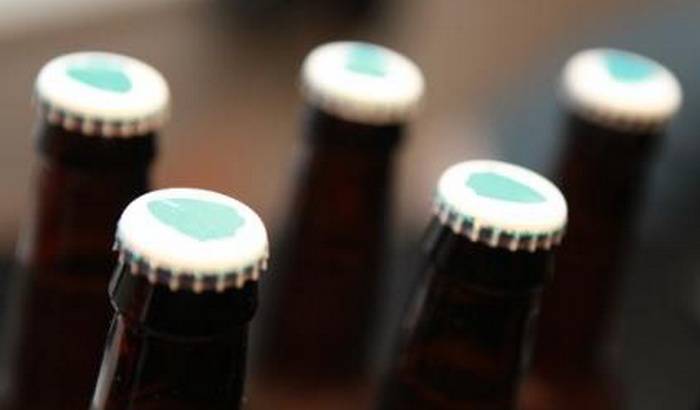
There are many myths about the benefits of beer during the training process.
Is beer isotonic?
Isotonic is a drink that helps restore water-salt balance in the body. And some argue that beer belongs to this type of drink. Imagine that you have run several kilometers along a ski slope. And even considering that it’s not at all hot outside, your body has lost a lot of salt and liquid, and 0.5 foam seems like the ultimate dream for many.
But hudeem-bez-problem.ru will reveal the truth: in fact, beer does not contain the amount of salts and minerals necessary for the body.
All that your body will notice at this moment is alcohol, which, in fact, is poison for us. And all your energy will be spent on removing poison from the body, and not on restoring your body after a long workout. All this can lead to muscle spasms and liver dysfunction.
Does beer prevent lactic acid buildup?
During physical activity and muscle work, lactic acid begins to accumulate in the body. This breakdown product is precisely responsible for pain after exercise. And many noticed that a glass of beer after training can reduce pain, after which it was concluded that this drink reduces the formation of lactic acid.
But in fact, such a decrease in pain is associated with the influence of alcohol, that is, with a person’s intoxication.
In addition, alcohol can increase the time it takes for lactic acid to leave the muscles.
A common myth and its refutation
Many athletes answer the question “is it possible to drink beer after the gym” in the affirmative, and this is their main mistake. There is a myth that beer contains carbohydrates, which have a beneficial effect on the body during the time period when the protein-carbohydrate window is open.
Indeed, there are carbohydrates in beer, but they belong to the complex category. Instead of spending strength and energy on muscle recovery after intense strength training, the body throws away all its reserves to break down the incoming compounds. Often everything accumulates “in reserve”, that is, it turns into fat deposits. In this case, there is no point in talking about the advisability of training; it will not fulfill its intended function, will not help you lose weight and form a beautiful, fit figure.
What happens if you drink beer after training?
Beer quickly quenches thirst, relaxes tense muscles, and saturates the body with microelements. However, it should be understood that every workout is another stress for the general condition of a person. Physical activity increases blood pressure, makes the heart beat faster, the lungs pump a significant volume of air, and in general the whole body begins to work more intensely and at an accelerated pace.
Therefore, it is not recommended to drink beer immediately after finishing a workout, since it first slows down the normal functioning of the liver, then the negative effect affects the kidneys - ultimately dehydration of the body occurs.
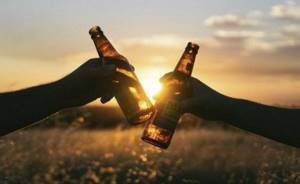
We recommend that you find out in more detail whether beer is healthy and what its harm is.
There is an opinion that beer increases the body's strength capabilities, although this does not at all coincide with reality. Although it suppresses the feeling of fatigue, in general the body, on the contrary, loses even more strength. Since a lot of energy was spent during the workout, and the water balance was also disturbed, and besides, you need to spend energy on assimilating an alcoholic drink, which also leads to rapid fluid loss, this will only bring additional stress to the body and cause harm.
Harm
Ethyl occupies the leading position in the composition of beer: it is this substance that gives a state of euphoria and relaxation. But in fact, drinking this type of alcohol causes enormous harm to the body of the person who is training. What does it consist of:
Read more about the benefits and harms of dark beer.
Is there any benefit
Some scientists and athletes talk about the benefits of beer in moderate doses 6-7 hours after training. But we are talking only about dark beer. The composition of antioxidants in this drink is close to the antioxidants in red wine, which is moderately beneficial for the circulatory and cardiovascular systems.
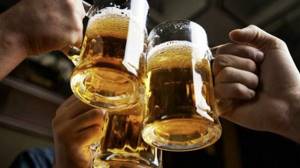
If you want to drink beer after training and at the same time minimize its negative effects, consider these recommendations:
- It is better to drink dark varieties.
- You should not exercise for 2 days after drinking alcohol.
- To restore the body's water balance, drink a lot of water the next day after taking the drink. You can also buy medications at the pharmacy to improve your water balance.
- Take more vitamins.
Effect on testosterone
As you know, frequent consumption of alcoholic beverages negatively affects the entire body.
The cardiovascular system is under particular attack. If you prefer active sports, such as jogging, volleyball, basketball, tennis, football, then your cardiovascular system receives a very heavy load during training. Alcohol is a foreign substance for the human body, and in addition it also has a kind of alcoholic load on us. After an active workout, your heart needs rest, so drinking beer may not be the best solution.
It's no secret that in order to build muscles, the body must synthesize a large amount of the male hormone - testosterone. Oddly enough, beer contains a very large amount of substances that are similar in composition to female sex hormones. Therefore, excessive beer consumption can lead to a significant decrease in testosterone levels.
Of course, many athletes are interested in whether they can drink beer after training. If you don’t want to have feminine curves instead of beautiful, sculpted muscles, it’s not worth the risk. However, girls are sometimes allowed to drink a little beer. But it is best to do this regardless of the training process.
Beer doesn't dehydrate you
Drink in moderation. Scientists haven't published any research yet on whether beer is an ideal recovery drink, but it will keep you hydrated after a workout. A 2015 study in the Journal of the International Sports Society sampled a group of 16 male athletes. Some drank mineral water after a hard workout, others drank beer and mineral water. There were no significant differences in their hydration levels. A 2015 study in the International Journal of Sports Nutrition and Metabolism found that light beer with added sodium helps hydrate after exercise.
conclusions
Of course, drinking beer is a great way to relax with friends. But under no circumstances do this after visiting the gym! If you decide not to deny yourself pleasure, then it’s better not to go to training that day. Drinking alcohol after exercise simply destroys your body.
Such processes can be called positive stress, since moderate physical activity brings invaluable benefits to the body. But with the simultaneous use of alcohol, the state enters the distress phase. This is a condition that the body can no longer cope with, so it uses up its reserves.
Therefore, we can conclude: if you want to have excellent health and a beautiful body, forget about drinking beer and other alcoholic beverages after training. You can always find a good alternative that will only benefit your body. By giving up alcohol, you will notice an improvement in all sports performance.
Motion Balance
The World Health Organization recommends that adults need at least 150 minutes of moderate physical activity (or 75 minutes of vigorous activity) per week. Not only training itself is considered, but also everyday activity (walking and strolling, non-sedentary work, household chores, active games with children).
As for alcohol, evidence-based medicine, of course, does not call it useful and necessary, but believes that moderate alcohol consumption will not harm a healthy person who leads an active lifestyle, eats right, does not smoke, is not overweight and is not prone to addiction.
The paradox of moderate consumption
Many studies suggest a U-shaped relationship between alcohol consumption and health. Those who drink alcohol in moderation live longer and healthier lives, while abstainers and those who abuse alcohol lag behind.
So far, science does not have a consensus on why such a relationship is observed. Perhaps it is the positive effects of the chemicals in beer and wine (or even ethanol itself), or perhaps it is the ability of moderate doses of alcohol to relax and serve as a “social lubricant.”

Another interesting correlation: a review of studies published in the journal Frontiers in Psychiatry in 2015 shows that on training days people tend to drink more alcohol - the elated mood caused by endorphins (the same runner's high) is very desirable to supplement with a couple of glasses.
Rating of the most “Sober” regions of Russia[edit | edit code]
The federal project “Sober Russia” and the Center for Information Communications “Rating” conducted a joint study on the problem of alcoholism and assessing the effectiveness of anti-alcohol policy in the regions of the Russian Federation. The most important indicators for assessing the degree of alcoholization in regions and associated social tension were used as the basis for compiling the rating:
- number of patients with alcoholism and alcohol dependence;
- mortality from alcohol poisoning;
- crimes committed while intoxicated;
- vodka sales volumes;
- beer sales volumes;
- the strength of anti-alcohol legislation in the constituent entities of the Russian Federation
The study also necessarily took into account the opinion of experts and representatives of non-profit public organizations involved in monitoring the alcohol situation in the regions of the Russian Federation.
Table of prosperous areas of the country
| Place | Region |
| 1 | Chechen Republic |
| 2 | The Republic of Ingushetia |
| 3 | The Republic of Dagestan |
| 4 | Moscow |
| 5 | Saint Petersburg |
| 6 | Rostov region |
| 7 | Kabardino-Balkarian Republic |
| 8 | Volgograd region |
| 9 | Krasnodar region |
| 10 | Republic of North Ossetia-Alania |
| 11 | Stavropol region |
| 12 | Belgorod region |
| 13 | Republic of Kalmykia |
| 14 | Republic of Crimea |
| 15 | Republic of Tatarstan |
| 16 | Moscow region |
| 17 | Tomsk region |
| 18 | Republic of Bashkortostan |
| 19 | Sverdlovsk region |
You can find out the locations of other regions of the country here.
What to do if you still have to drink alcohol
Regardless of our preferences, there are situations when it is simply impossible not to drink. The most common case is some important and fun holiday (best friend’s birthday, wedding, New Year, and so on). If you have such a day coming up, then this is not a reason to postpone training.
You can consume protein after waking up, and do the exercise in the first half of the day. It is recommended to skip the evening portion of sports nutrition, since it still will not give much effect when combined with alcohol. It’s clearly not worth wasting high-quality and expensive protein.
Other useful tips
- When drinking alcohol, don't forget about a snack. It is best if it is a protein food. The ideal option would be fish, cottage cheese, meat, eggs.
- After the holiday, the water balance needs to be restored. Take at least two liters of water per day.
- Provide yourself with vitamins. Ascorbic and succinic acid work well.
- Avoid drinking alcohol for the next few weeks.
- Take a break from training for at least a few days until your body goes through the full recovery stage. Also leave the protein aside at this time.
Take this into account! All this is true only when you drink alcohol occasionally. A normal combination of sports and constant “friendship” with a bottle is not possible.
An excellent student from Moscow has invented a fat burner! 12 cm in the waist goes away in a week if mixed with kefir... Read more
Revolutionary technology for losing weight at home. Lose excess weight without dieting or training! In just 23 minutes a day. Buy
Age-related fat does not come from food! You will lose 22 kg of fat in a week if you drink 150 ml of hot water on an empty stomach... Read more
What is the best thing to drink after a workout?
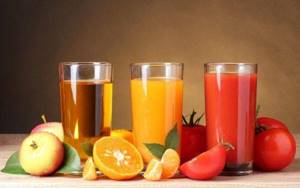
Instead of poisoning the body with booze, it should be helped to recover from intense exercise. Experts offer many tasty and healthy options:
- Cocoa quickly restores protein and carbohydrate reserves. But you can use it no earlier than two hours after the gym.
- Freshly squeezed juices are an excellent source of fast sugars. They are needed to close the “carbohydrate window”.
- BSA, amino acids, protein, and other specialized drinks specifically work on recovery after exercise. But before taking them, you need to consult your trainer.
- Plain water with a pinch of salt will help restore fluid loss during exercise.
- Milk – restores the balance of vitamins and macroelements. It saturates well and quenches thirst.
Whether or not to combine drinking with sports is a personal choice. But before you make a final decision, you should think about whether fleeting pleasure is worth so much work put into a healthy, beautiful body.
2 hours after training
Protein production is important for building muscle. Alcohol slows down this important process. To restore strength, spent calories, the body begins to use tissue reserves of internal organs. Doctors' opinion: the period of 10 hours before and 10 after training is undesirable for drinking alcohol; muscles will not be able to recover. The body will begin to eliminate toxins obtained from beer.
We suggest you read: Is it possible to drink a lot of beer?
Alcohol is strictly contraindicated for professional athletes. Those who exercise two or three times a week can afford some beer, wine or cognac after 5-6 hours. It is better to try to give up alcohol altogether. Or drink beer in moderation, occasionally, when there are no workouts. The resulting effect lasts for 2-3 days.
80% of muscle composition is water. Any alcoholic drink can cause dehydration of the body, a lack of minerals, vitamins A, C, group B, then muscle tissue is damaged and takes longer to recover. A deceptive opinion: beer harmlessly quenches thirst and replenishes fluid taken from a grueling workout. It has a diuretic effect and leads to rapid dehydration.
After completing your workout, it is recommended to drink tea. Desirable options are mate, green - tonic, invigorating at the same time, increasing immunity. The first two hours after training are the most dangerous. There is a possibility of catching an acute respiratory infection, some kind of virus. Tea is especially beneficial for athletes. It is also appropriate to drink herbal teas and regular still water.
Prelude
To answer the question about the benefits/harms of alcohol and beer in particular for building muscle mass, you must first understand how to evaluate it.
There are several indicators by measuring which you can evaluate the effectiveness of something for gaining weight:
muscle protein synthesis rate
When we exercise, muscle fibers are damaged, sending many signals to the body. Over the next one or two days, muscle cells recover and become stronger and larger.
The rate of muscle protein synthesis directly affects muscle growth.
testosterone level
Another important criterion is the level of the anatomical hormone testosterone in the blood. The higher it is, the more favorable the conditions for gaining muscle mass.
That is why in sports and bodybuilding they try to manipulate it in various ways (by taking anabolic steroids or testosterone boosters).
sports performance or effectiveness or efficiency
Scientists like this parameter least of all, since it is very difficult to accurately measure.
Thus, in order to understand whether beer and alcohol are beneficial or harmful for bodybuilding, it is necessary to understand how their consumption affects muscle protein synthesis (suppress or enhance), tetosterone levels (increase or decrease), and athletic performance.
We recommend: How to gain muscle mass? Beginner's Guide
The effect of alcohol on muscles and bodily constitution
Regular alcohol consumption leads to pathological changes in many organs, including muscles, which manifests itself in muscle breakdown and decreased muscle strength.
This occurs due to a disruption in the mechanism of muscle protein synthesis 11.
Scientists have shown that drinking 70 grams of alcohol reduces the rate of protein creation in the liver by approximately 30% 1. Alcohol also reduces muscle strength and reaction speed 10 and does NOT affect the rate of recovery after exercise 9, as is commonly believed.
We suggest you familiarize yourself with the Calorie content of Lech non-alcoholic beer. Chemical composition and nutritional value.
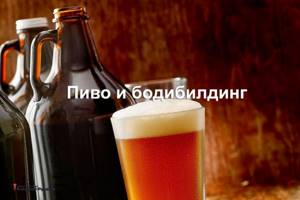
A study of 250 chronic alcoholics found a significant decrease in muscle mass in half of them, as well as a number of other chronic diseases 12 .
Can you avoid muscle breakdown by consuming more protein with alcohol?
Yes, you can.
Share with us your experience of losing weight, using sports nutrition or pharmacology!
We recommend: Powerful and deadly.. The mechanism of action of insulin in bodybuilding for gaining muscle mass and losing weight
In a recent study, scientists set out to find out how drinking alcohol with protein affects the rate of muscle protein synthesis 13.
8 athletes drank one of three drinks after a hard combined workout:
- whey protein (500 ml, 25 g protein);
- a large dose of alcohol (1.5 g/kg, approximately 7 bottles of beer) with protein;
- alcohol with carbohydrates (25 g maltodextrin).
Result: When post-workout drinking beer (alcohol) WITHOUT protein, muscle protein synthesis is suppressed by 40% compared to when whey protein is used as a post-workout drink.
If you drink protein along with alcohol, the degree of suppression decreases by 15%!
Thus, we can conclude that consuming protein along with alcohol smoothes out its destructive effect on muscles.
But in any case, the presence of alcohol in the blood inhibits muscle protein synthesis.
We recommend: Is protein harmful to health? Scientific facts
Testosterone is the most important male sex hormone; the more of it in the body, the easier and faster muscle mass builds.
Does alcohol affect testosterone levels in the body?
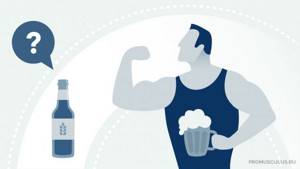
Yes. But what matters is the dose and regularity of use.
- Occasional use in small doses
Studies have shown no change in testosterone levels when moderate doses (0.8-1 g/kg) were consumed by strength athletes 2 and rugby players (1 g/kg) 3.
In both examples we are talking about short-term episodic alcohol use.
In the first case, the athletes drank alcohol for 3 days after training. Testosterone levels did not change, nor did cortisol, a catabolic hormone responsible for the breakdown of muscle mass.
In the second case, after rugby players drank alcohol after the game, there was a deterioration in strength and speed indicators, but testosterone levels did not change.
And the following study is very interesting: when young people consumed alcohol in a small dose equivalent to about 2 bottles of beer (0.5 g/kg), testosterone levels increased by about 17% 4 [1].
This is not as much as it might seem. In the human body, testosterone levels fluctuate within these limits even without stimulation by alcohol.
By comparison, athletes who take anabolic steroids experience an average increase in testosterone levels of 100%.
We recommend: 10 symptoms of low testosterone in men
Let's move on. We increase the duration and frequency of administration.
- Regular use in small doses
In the following experiment, middle-aged men and women drank beer for dinner, the equivalent of 40 and 30 g of alcohol for men and women, respectively (approximately 0.5 liters of beer) daily for 3 weeks.
Result: DHEA hormone levels increased by an average of 17% in both men and women; testosterone levels decreased by 7% in men and did not change in women; the level of estradiol (female sex hormone) has not changed; In both groups, blood cholesterol levels increased by 12%.
We increase the dose.
Large doses of alcohol 1.5-1.75 g/kg (120 g or approximately 2 liters of beer) significantly suppress testosterone production by 23%; the effect lasts more than a day and testosterone levels are restored only after 36 hours5,7,8.
Also, at high doses, the relative proportion of the catabolic hormone cortisol in the blood increases, which destroys muscles 9.
We recommend: Testosterone boosters: 8 best drugs to increase testosterone
We suggest you read: How long does it take for beer to leave the body completely?
Another mechanism for impaired muscle growth when drinking alcohol and beer in particular is the fact that this leads to dehydration.
Poor hydration, firstly, negatively affects the intensity of the workout and increases fatigue.
Secondly, muscle protein synthesis decreases, an important condition for which is a good supply of muscle cells with fluid, which is a transport medium for nutrients (this is what happens when using creatine in bodybuilding).
Alcohol in the body blocks the absorption of trace elements (calcium, phosphorus, magnesium, iron and potassium), which are responsible for the contraction and relaxation of muscle fibers and have a direct effect on their growth.
We recommend: Energy drinks for athletes: effects on the body and RISKS | Scientific facts
Alcohol is a very high-calorie product. While each gram of protein and carbohydrates contains 4 calories, each gram of fat contains 8 calories, and each gram of alcohol contains 7 calories.
Moreover, these are “empty” calories, which carry only energy and no nutrients.
In practice, this means that 1 liter of vodka contains approximately 2000 calories, and 1 liter of beer contains ~400 calories.
Also, when drinking alcohol, your appetite is well stimulated: the total calorie content of evening relaxation can easily be half the daily requirement...
Be that as it may, the fact that beer makes bellies grow is a fact that is difficult to argue with. Confirmation can always be seen in the average male in our society who is over 40...
Needless to say, the higher the percentage of body fat, the worse the relief, even with relatively large muscle mass.
We recommend: How to lose weight in the stomach and how effective are abdominal exercises alone?
Harmful product
So, many athletes are interested in: is alcohol allowed after training? Unfortunately, any alcohol-containing drinks are not the best choice for an athlete. Their main harm is that they slow down metabolic processes and the recovery period, which is so important for muscle growth, is wasted.
In addition, beer after training has other negative effects on the athlete’s body:
- Alcoholic drinks inhibit the production of testosterone, an anabolic hormone. These protein structures are “responsible” not only for direct muscle growth, but also for protein synthesis in myotic fibers. Unfortunately, just one bottle of beer, drunk after training, can reduce all its results to “no”.
- Alcohol reduces the level of glycogen in an athlete’s body - it is a natural source of energy; it is obvious that each subsequent load will be more and more difficult for the athlete.
- If we are talking not about strength training, but about cardio training, the situation becomes even more complicated. Aerobic exercise is, first of all, increased work of the heart. What happens to the body during this period? Blood circulation is activated, the blood is more quickly saturated with oxygen. Accordingly, any alcohol after a workout will, firstly, be absorbed much faster, and, secondly, provoke a rapid heartbeat. The result of such increased stress can be serious diseases of the cardiovascular system.
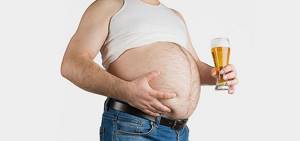
Is it possible to drink beer before training?
Drinking beer before or during training deserves special attention.
First of all, an increase in blood alcohol content has a relaxing effect on the body in general and on physical activity in particular. Accordingly, drinking beer during training will leave no chance of even maintaining the existing result, let alone increasing it.
In addition, decreased nervous system activity and poor coordination can cause serious injury in some free weight exercises, such as various types of barbell presses. Also, insufficient nervous activity will exclude the possibility of forcing the muscles to produce a result superior to that shown in the previous workout. Thus, the presence of alcohol in the blood increases the risk of injury and reduces the likelihood of progress.
Also, when considering whether you can drink beer before training, it is advisable to take into account the calorie content of this drink. It is worth noting that the assimilation of any product requires energy expenditure, and under conditions of increased physical activity, the cost of breaking down the components of beer will cause a decrease in strength indicators.
Another aspect is the water balance, which is disturbed by the beer consumed, regardless of the type - regular or non-alcoholic.
Doses of alcohol and their effect on the bodybuilder’s body
With regular exercise in the gym, it is better to give up alcohol, but if this is still not possible, then there is a list of doses of ethyl alcohol that have different effects on the athlete’s success.
- 25 g per 70 kg body weight. This dose has a slight tonic effect, the activity of the thyroid gland is inhibited. On the part of the central nervous system, inhibition of the perception process is observed, fat utilization is inhibited. The ratio of fat and muscle tissue changes and this has a bad effect on the athlete’s activity.
- From 25 to 35 g per 70 kg body weight. This dosage corresponds to 80 g of vodka or one glass of wine. The amount of cortisol in the bloodstream increases.
- Over 35 g per 70 kg body weight. Somatotropin is not produced, because of this the fat burning process is practically suspended.
Based on all of the above, we can conclude that alcohol is not compatible with bodybuilding, despite small doses. If a bodybuilder wants to achieve excellent results in this area, as well as take prizes, then all alcohol-containing liquids are completely prohibited for him.
Beer in the evening on training day
Any person's leisure time includes holidays. After training in the evening, are you planning an alcoholic feast, a party, watching a football match, drinking beer? It's hard to refuse. Remember the only rule is to drink in moderation. The poisonous dose of ethyl alcohol is 40 grams, which is equal to 600 milliliters of beer.
After drinking a lot of alcohol in the evening, reschedule your upcoming workout for another day. The body removes toxins and spends energy processing alcohol. When you start training, you risk causing significant harm to your health. The alcohol will finally leave the blood, the cardiovascular and muscular systems will normalize after 5-7 days.
